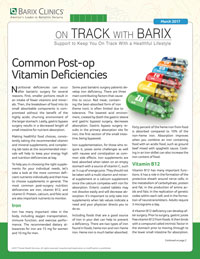Nutritional deficiencies can occur after bariatric surgery for several reasons. First, smaller portions result in an intake of fewer vitamins and minerals. Then, the breakdown of food into its small absorbable components is compromised without the benefit of the highly acidic churning environment of the larger stomach. Lastly, gastric bypass surgery results in a decreased length of small intestine for nutrient absorption.
Making healthful food choices, consistently taking the recommended vitamin and mineral supplements, and completing lab tests at the recommended intervals will help to keep your energy high and nutrition deficiencies at bay.
To help you in choosing the right supplements for your individual needs, let’s take a look at the more common deficient nutrients individually and then how to choose supplements in general. The most common post-surgery nutrition deficiencies are iron, vitamin B 12, and vitamin D. Protein, calcium, and folic acid are also important nutrients to monitor.
Download On Track with Barix: Common Post-op Vitamin Deficiencies


